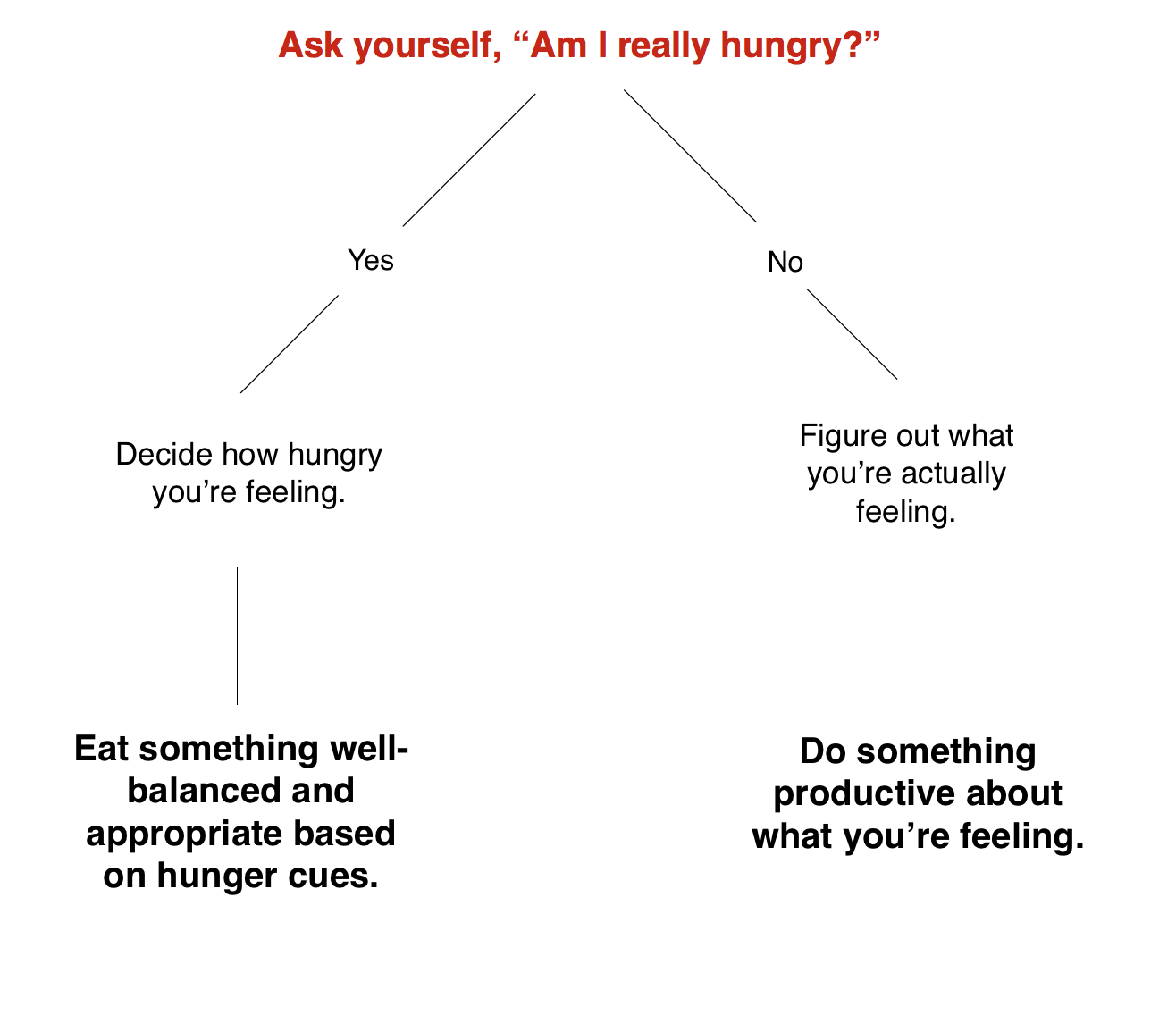
If we were all able to eat when we’re hungry and stop when we’re sufficiently full, we’d be the right weight for our individual bodies. Our bodies are equipped with innate sensors telling us when we need to eat and when we are satiated. So what gets in the way of eating when we’re hungry and stopping when we’re full? What causes us to sabotage our natural hunger regulators? Why do so many of us fall prey to cravings, mindless eating and emotional eating?
Emotional eating can rear its ugly head in many ways. Eating just because you’re bored, tired, lonely, anxious, uncomfortable, happy and so forth all count as emotional eating. Emotional eating and feeling out of control around food can be a problem at any weight; you don’t have to be overweight to struggle with it. Eating our emotions gets in the way of really understanding our hunger and fullness cues.
WHY SHOULD YOU ADDRESS EMOTIONAL EATING?
Getting emotional eating under control can make a difference in not only weight, but it can also lead to a greater sense of peace about food, body image and other related issues. Since we all want to be healthy physically, mentally and otherwise, how can we stop eating our emotions? I’m so glad you asked! The first step is pausing and asking yourself if you’re really hungry.
ASK YOURSELF IF YOU’RE TRULY HUNGRY
I know—it sounds too simple, but part of learning how to stop eating your emotions means investing the time to stop and assess yourself. Before reaching for something to eat, briefly pause and ask yourself if you’re physiologically hungry. Take a moment to decide if the feeling you are experiencing is true hunger or if it’s something else. If you decide it’s real hunger, go prepare a meal or snack that’s suitable for the time of day and the amount of hunger you’re experiencing. If you’d like some help assessing whether you’re physiologically hungry, read more about the hunger scale.
If you pause and figure out you’re experiencing some other emotion (such as boredom, anxiety, loneliness, fatigue, etc.) take actions that make sense based on that emotion.
For example, if you want to reach for something to eat, but you pause and decide you’re really feeling bored and lonely, reach out to a friend, go for a walk, write a letter or create something. If you decide you’re feeling anxious about an upcoming deadline, create a list of tasks to be completed and start checking things off.
Are you a visual learner? Check out this simple eating-decision tree below.

THREE TIPS TO STOP EATING YOUR EMOTIONS
Now that we’ve talked through the basic principle of listening to hunger cues, the next step is to figure out how to be more attuned and aware of what our bodies are trying to tell us. Here are three simple tips to help you differentiate true hunger cues from emotional triggers.
1. Stop with the all-or-nothing thinking. Emotional eating is often a result of not feeling good enough or determining that we’ve already “messed up” for the day, so we might as well really mess up by eating this entire gallon of ice cream! Avoid this destructive thought process. Instead, remember: Healthy eating is not perfect eating, and perfect eating is not healthy eating. No one is “perfect” with eating, so don’t let one day or moment of careless eating affect your eating choices. Each day is a new opportunity to nourish your body and to develop greater sensitivity to your hunger and fullness cues.
2. Eat mindfully. Have a glass of water. Sometimes we feel hunger when it’s actually thirst. Let eating be its own activity. Don’t eat while driving, working at the computer, watching TV and so forth. Make decisions about what to eat at the grocery store; it’s much easier to avoid troublesome food items when they are not in your cupboard. When you do sit down to eat, be present in the moment, enjoying not only the taste of the food but also the texture, smell, sight, sound and the company around you.
3. Reach out. Don’t be afraid to ask for help if you feel your emotional eating has gotten out of control. Reach out to trusted loved ones with defined ways they might be able to support you in your efforts. Consider discussing these food struggles with a professional who is equipped with knowledge and training specific to emotional eating issues. A registered dietitian (RD) and a qualified mental health professional are good places to start in your search for a healthier relationship with food.
Improving your relationship with food takes practice, so it’s OK not to have immediate results. Celebrate your successes, and learn from your struggles as you continue to move forward and make improvements. Be compassionate and kind to yourself, and remember to pause before eating, listen to your body and honor what it’s telling you to do.



